This week's gathering in Budapest could not have more starkly illustrated the unease gripping Europe as Donald Trump romped home in the US.
The timing and location were everything.
The host, Hungarian Prime Minister Viktor Orban, who has, uniquely among EU leaders, embraced Trump’s brand of toxic politics, basked in the spotlight, hailing Trump’s win as a "victory for world peace" and declaring that it would change Europe’s tune on Ukraine.
Orban’s schadenfreude was complete with the collapse of Chancellor Olaf Scholz’s coalition in Germany while France, which is the other half of the integration engine, is mired in dysfunction itself with President Macron unable to project European leadership.
Leaders meeting at the European Political Community summit (the EU plus 18 non-EU states) were quick to congratulate Trump.
However, they were desperate to control the narrative before he settled into the White House.
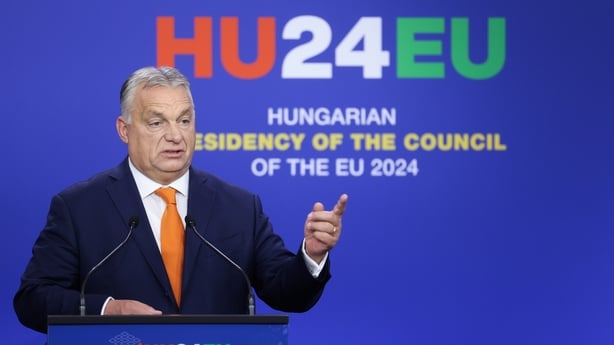
That narrative being that a strong transatlantic relationship - both on the economic and security front - is in the interest of the US president-elect, especially on Ukraine.
Both European Commission President Ursula von der Leyen and NATO Secretary General Mark Rutte said they'd worked well with Trump in the past, the latter praising the former and future US president for successfully badgering NATO members into increasing defence spending above the 2% of GDP target (much of that, in reality, was thanks to Russian President Vladimir Putin’s invasion of Ukraine).
Masking the diplomatic blandishments is a real concern about what Trump 2.0 will bring.
The Republican has threatened 10% tariffs on European exports, and to withdraw support from Ukraine.
The billionaire could also drop sanctions against the Kremlin and disengage from NATO (leaving Ukraine potentially defenseless against Russia’s airstrikes and advancing troops).
It is not a great moment for the EU to be hit by tariffs with a potential knock on trade with China (if Trump slaps 60% tariffs on the Chinese, that could prompt a flood of Chinese exports into Europe), or a Russian takeover of Ukraine (followed by a massive wave of Ukrainian refugees heading west).
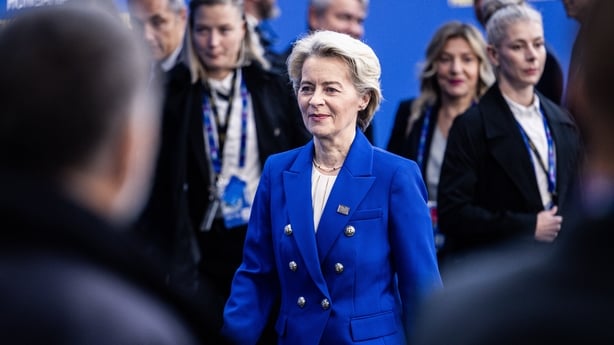
The EU institutions are also in transition.
Von der Leyen is winding down her first mandate, and the commissioners-designate for the next one are still seeking approval from the European Parliament.
Goldman Sachs has already cut its forecast for Eurozone growth for 2025 from 1.1% to 0.8% and that’s just based on limited tariffs, not the 10% that Trump could impose.
Even before the US election, the EU had been wrestling with stagnant growth and a lack of competitiveness.
This is, therefore, an interregnum which is pregnant with trepidation.
The idea of Europe standing united, but alone, wafted through the news conferences in Budapest.
"We've shown that Europe can take responsibility by standing together," said Von der Leyen.
"Standing together, we overcame the economic impact of the pandemic. We've shown this in the severe energy crisis that was unleashed by Russia's war in Ukraine."
Before jetting back to dissolve the Dáil, Taoiseach Simon Harris said Europe’s "strategic autonomy" was now everything:
"The importance of controlling what we can control here in Europe. No other part of the world owes us a living," the Taoiseach said.
A hugely strategic part of what Europe wants to control is that Ukraine does not fall under Russian subjugation.
Yet Orban warned that Trump’s victory really meant Europe could no longer support Ukraine the way it has.
"The Americans will quit this war," he told Hungarian state radio.
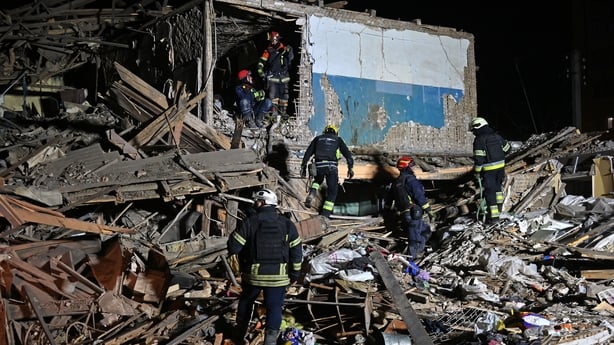
No-one, not least Ukraine's president Volodymyr Zelensky, is under any illusion as to what Orban's, and the Russian leader's, version of "peace" means.
The Ukrainian leader Zelensky told reporters in Budapest, that talks of a ceasefire were "dangerous" and "irresponsible" and would in no way guarantee Ukraine’s security.
"What's next?" he asked, alluding to the North Korean troops who were helping Russia kill civilians on European soil.
"Should Europe seek the favour of [North Korean leader] Kim Jong Un in the hope that he, too, will leave Europe in peace? "
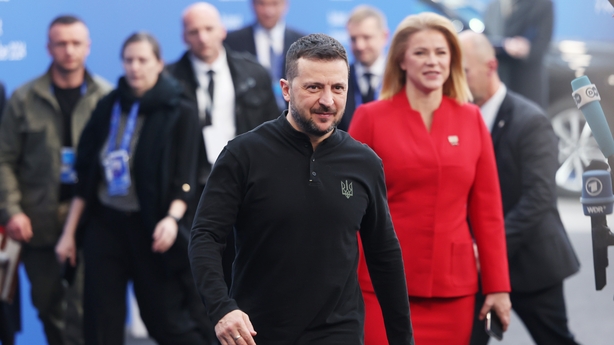
Europe faces a moment of peril - having to compensate for the possible withdrawal of US military support for Ukraine, at a time when EU resolve is being corroded by right-wing apologists for Russia (Orban included), and by a perilous economic landscape.
However, Belgian Prime Minister Alexander de Croo disputed the view that Europe was helpless without a US defence shield.
"More than half the military support for Ukraine is already coming from European countries, so the idea that Ukraine can only defend itself with American help is incorrect," he said.
"Whether we have to step up support or whether it remains a joint effort will have to be seen. We have two months to prepare."
Even if Trump’s more outlandish campaign promises do not materialise, and even if this is the wake up call for Europe to deepen the defence capabilities that leaders like Poland’s Donald Tusk dream of - the more sober analysis is that the EU will struggle.
"The prospect of a faster US pivot away from Europe in security terms is daunting even for those who welcome greater European strategic autonomy," says Ian Lessor, distinguished fellow at the German Marshall Fund.
"This goal, however, remains largely aspirational. Europe’s ability to compensate for shifts in American defence posture and credibility is many years away at best."
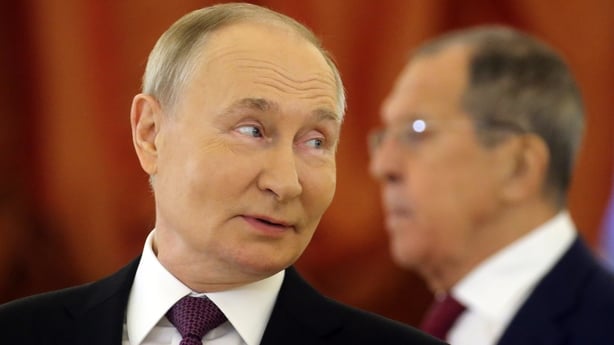
With Russia gaining territory in Ukraine, talk of Kyiv moderating its maximalist war aims of expelling Russian troops from all its territory is gaining ground, even in non-Trump circles.
"[Washington] should still define victory as Kyiv remaining sovereign and independent, free to join whatever alliances and associations it wants," writes Richard N Haas, former US envoy to Northern Ireland and the doyen of the American foreign policy establishment, in Foreign Affairs.
"But it should jettison the idea that, to win, Kyiv needs to liberate all its land. So as the United States and its allies continue to arm Ukraine, they must take the uncomfortable step of pushing Kyiv to negotiate with the Kremlin - and laying out a clear sense of how it should do so."
Read more:
Key takeaways from the US presidential election
Why Ireland should be worried about Trump 2.0
That suggests Trump has some open political space to push Ukraine into some very painful compromises.
The US president-elect appears to reserve a particular personal animus towards Ukraine, believing the country’s war effort is a drain on US money and military reserves, and that Europeans should look after - and pay for - the problem themselves.
Trump has long admired Putin, and has previously suggested he could do a deal with the Russian leader to end the war within 24 hours.
His Vice-President-elect JD Vance has also made his disregard for Ukraine’s future clear.
That said, various factions - some hawkish on Ukraine, others more traditionally-minded - will be competing to grip Trump’s elbow.
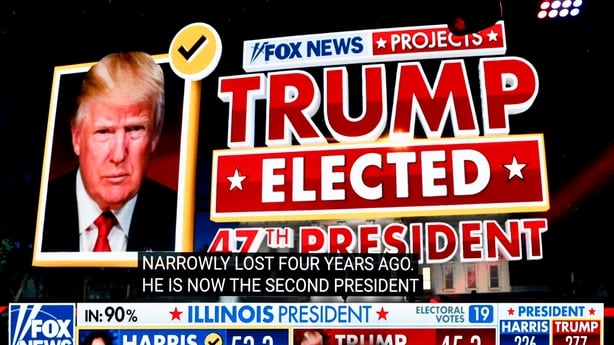
The Wall Street Journal this week quoted three members of Trump’s team who suggested a typically transactional approach to ending the war.
One idea would be that the conflict be frozen along current lines (with Russia still occupying 20% of Ukrainian territory), with Ukraine promising not to join NATO for at least 20 years in exchange for continued US weapons supplies.
A 1,300km demilitarised zone would be policed by European troops.
"We are not sending American men and women to uphold peace in Ukraine," the paper quoted one Trump team member as saying, adding:
"We are not paying for it. Get the Poles, Germans, British, and French to do it."
By contrast, Trump’s former Secretary of State Mike Pompeo, who has been tipped to become Defence Secretary, suggested in June that Trump would not abandon Ukraine.
Pompeo said Trump should impose tougher sanctions on Russia, bulk up America’s arms production, strengthen NATO, create a $500 billion (€467 billion) lend-lease programme for Ukraine, and lift the restrictions on what kinds of weapons the under-fire nation can obtain and use.
The leading authority on Russian history, Stephen Kotkin is more cautious:
"It may turn out to be worse for Ukraine, but it may turn out to be better. It’s extremely hard to predict because Trump is hard to predict, even for himself."
However, he suggested that Ukraine cannot come to the negotiating table unless Vladimir Putin has an incentive to do the same.
"The main problem is that there’s been insufficient political pressure on the Putin regime," says Kotkin.
Overall, then, Europe’s options are limited.
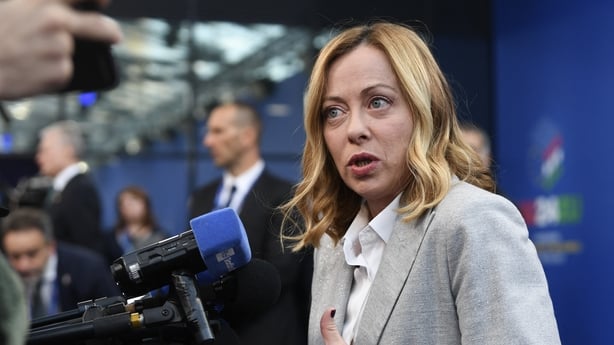
"Europeans are likely to elbow their way into Washington to try and become the president’s bestie and go-to European ally, including at the expense of fellow Europeans," says Célia Belin, senior policy fellow with the European Council on Foreign Relations (ECFR).
"They may engage in transactional bargaining – buying US weapons in exchange for security guarantees or supporting US policy on China in the hope that the United States reciprocates on Russia – and hope for the best."
However, Belin makes the point that a transactional relationship is always short term.
Instead, Europe would have to develop a strong, coherent strategy on how to deal with the United States under Trump, for both its economic stability and security.
But developing such a coherent approach is, at the best of times, tricky for the EU.
France is historically wary of too close an embrace while insisting on member states buying European (ie, French) weapons instead of American ones.
Furthermore, Trump has a growing band of populist or far right allies in Europe, either in government or in opposition, who have the potential to corrode a unified approach that supports Ukraine.
Read more stories from around Europe
The US president-elect, in turn, will be quite capable of lavishing his own support on European far-right parties, such as the AfD in Germany, who will be contesting elections next year.
That means Italy’s Giorgia Meloni, a hard right prime minister close to the MAGA community, yet a strong supporter of Ukraine, could be a key liaison for the European side.
"If today we speak about the possibility of peace," she told reporters in Budapest. "It is because Ukraine has had tremendous courage and the West has helped. Let’s see how the scenario evolves in the next few weeks. As long as there is a war, Italy will be with Ukraine."
That means the weeks leading to the formation of the Trump administration will be critical, not least what happens on the battlefield in Ukraine. Trump has won the support of a majority of Americans, what he does with that mandate will have a huge impact on Europeans.






